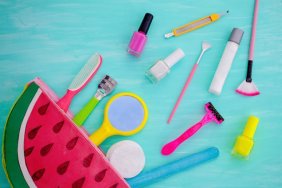Everyone told you things were going to be so much better in your 20s, especially for your skin. No longer would you wake up with a fresh batch of acne dotted across your cheeks. It was time to rejoice! And things went well for a while. But then, at around age 25, you started getting pimples again. But these weren’t your regular pimples. These are painful deep pimples (or cystic acne) that last way longer and hurt like hell. Why must adulthood be so cruel?
Adult acne happens to many of us and it can be hard to pinpoint exactly what’s causing it. We spoke with two top dermatologists to find out why we have adult acne, how to prevent it and how to get rid of it for good.
Adult acne causes
We hate to break it to all the females out there, but you’re more likely to get this kind of acne than men. You can blame it on hormones. “Adult acne and women is more common now than ever,” says Dr. Joshua Zeichner, director of cosmetic and clinical research in dermatology at Mount Sinai Hospital in New York City. “While we don’t totally understand why it’s developing, we do know that hormones play a large role. Hormonal surges during your menstrual cycle stimulate oil glands to rev up oil production, which clogs the pores and feeds acne-causing bacteria on the skin.”
The reason for these hormonal surges are due to your estrogen levels. “As we reach our 20s and 30s, our estrogen levels start to decline; the shift in hormone ratio between estrogen and testosterone causes a classic pattern of breakouts that typically affects the side of the face, the lower face and the neck,” says Dr. Rachel Nazarian, a dermatologist in New York City.
Adult acne treatment
Both Zeichner and Nazarian suggest topical acne treatments at first to rid yourself of hormonal acne. “Over-the-counter treatments like salicylic acid help remove excess oil and exfoliate dead cells from the skin surface,” says Zeichner. “Benzoyl peroxide also helps open up blocked pores and kills acne-causing bacteria on the skin.” Zeichner recommends a deep treatment that contains benzoyl peroxide and suggests starting to wash your face daily with the salicylic acid-infused Aveeno Clear Complexion Foaming Cleanser.
You should also look into regularly using a retinol. “Topical retinoids reduce inflammation in the skin and prevent cells from sticking together, blocking the follicles,” says Zeichner. Not only does the vitamin A in retinols help with this, but it also really helps in preventing wrinkles. Try Neutrogena Rapid Wrinkle Repair Serum. If you’ve never used a retinol before and you have sensitive skin, you’ll probably want to try an acid that’s less intense. Try Sunday Riley Good Genes All-In-One Lactic Acid Treatment every other night to exfoliate skin and prevent breakouts.
Adult acne prevention
To prevent adult acne breakouts, Nazarian recommends oral medications that can help bind circulating hormones. “Women can use hormonal therapies, such as spironolactone or birth control pills, which regulate the effects of the hormones on your oil glands,” adds Zeichner.
It’s also worth paying attention to your diet. Many acne sufferers swear by a daily probiotic supplement to help prevent or minimize adult acne. Probiotics are “good bacteria” that help break down bad bacteria in your gut. Though there haven’t been extensive studies to examine the relationship between probiotics and clearer skin (or whether there really is one), if you believe that diet affects your skin, it’s worth giving probiotics a try.
[ Next: Face Mapping Your Acne: What Your Breakouts May Be Telling You ]






